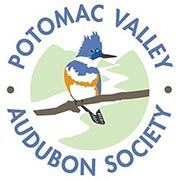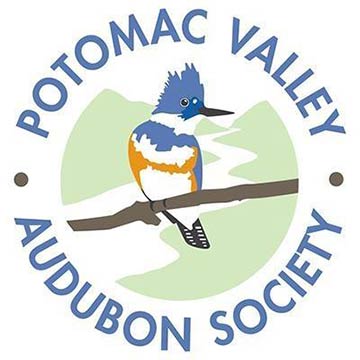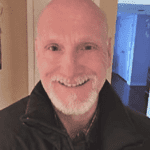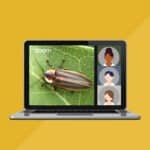PVAS offers monthly programs that are free and open to the public.
These presentations feature expert speakers on a variety of natural history and conservation topics with in-person programs. They are a great way to learn more about our natural world and meet others who love to learn too!
PVAS Monthly Programs occur on the second Thursday of each month from 7:00- 8:00 pm, excluding the summer months of June, July, and August, with some social time with light refreshments starting at 6:30 pm. We also skip December to allow for those who are traveling for the holidays.

 The programs are offered both in person and over Zoom, unless otherwise noted. Our in-person location is the auditorium at the Robert C. Byrd Center for Congressional History and Education at Shepherd University (213 N King St).
The programs are offered both in person and over Zoom, unless otherwise noted. Our in-person location is the auditorium at the Robert C. Byrd Center for Congressional History and Education at Shepherd University (213 N King St).
Where to park: Both Shepherdstown City parking and Shepherd University Campus parking are available.
- A map of city parking is here. Meters are not enforced after 6 pm. Spots along High Street are recommended.
- A map of campus parking is here. You may park in any of the Red lots. C and A are closest to the Byrd Center. Part of B lot is gated, but you may park in any spots near the Facilities building that are not behind the gate.
Click here to see what programs we have scheduled.
VIEW PAST PROGRAMS
If you are a Master Naturalists, these programs count towards your ongoing education hours.
Forest Stewardship Management Plans: How they can support healthy forests

Thursday, April 17, 2025
CLICK HERE FOR THE VIDEO RECORDING
CLICK HERE TO READ AN ARTICLE ON THIS TALK IN THE JOURNAL
Retired WV State Forester Herb Peddicord is bringing the forest to life with an inside look at the Forest Stewardship Management Plan he recently created for the Claymont Society for Continuous Education—an educational retreat center nestled in Jefferson County. Join Herb as he takes us on a journey through the planning process, from how landowners can apply through the WV Division of Forestry to what it’s like to conduct hands-on land surveys. He’ll dive into the fascinating details of timber density, soil types, and other key data he collected on Claymont’s 180 acres of forest, revealing how it all comes together to shape management recommendations for the next 10 years. Plus, he’ll share the exciting opportunities this plan unlocks, including potential funding sources, and explore other types of management plans available to landowners.
About the Presenter, Herb Peddicord:
American Kestrels: Nest Box Monitoring and Banding
 Thursday, March 13, 2025
Thursday, March 13, 2025
CLICK HERE FOR THE VIDEO RECORDING
The Grassland Birds booklets that October shared are also available online in both English and Spanish. You can also view more resources about grassland birds and habitat management available on the Virginia Grasslands Bird Initiative website here.
About the Presenter, October Greenfield:
Dark Sky Introduction: Light Pollution and What You Can Do About It
 Thursday, January 9, 2025
Thursday, January 9, 2025
CLICK HERE FOR THE VIDEO RECORDING
About the Presenter, Jesse Melton:
Leveraging Satellite Imagery and Machine Learning to Identify and Monitor Threats to the Environment
 Thursday, November 14, 2024
Thursday, November 14, 2024
CLICK HERE FOR THE VIDEO RECORDING
About the Presenter, Christian Thomas:
What’s A Bee City and How Do I Get One?
 Thursday, October 10, 2024
Thursday, October 10, 2024
CLICK HERE FOR THE VIDEO RECORDING
- What is a Bee City? Learn about the Bee City USA program and its mission to support pollinators by enhancing habitats, increasing native plantings, providing nesting sites, and reducing pesticide use.
- Why would your town want to be a Bee City? Discover the benefits of becoming a Bee City, including ecological improvements, enhanced community engagement, and a stronger local environment.
- Who would initiate it? Find out who can lead the charge in bringing this program to your community, including local leaders, organizations, and volunteers.
- When should it start? Get insights into the optimal timing and phases for launching a Bee City initiative in your area.
- How should it begin? Learn the practical steps and strategies for starting and sustaining a successful Bee City project.
Whether you’re a community leader, environmental advocate, or simply curious about making a positive impact, this event will equip you with valuable knowledge and actionable steps to support pollinator-friendly practices in your town. Click here to see Shepherdstown Bee City USA’s Facebook page to learn more.
About the Presenter, Linda Layne:
Make the World Safer for Birds and People: fixing lights and windows
 Thursday, September 12, 2024
Thursday, September 12, 2024
CLICK HERE FOR THE VIDEO RECORDING
Every year in the United States nearly one billion birds collide with lit structures and glass, mainly at low-rise buildings and homes. Light attracts migrating birds thereby increasing their risk of collisions with buildings and other structures. Fortunately, we can use easy and cost-saving solutions. By turning off unnecessary lights, closing curtains, and adding small, discrete patterns spaced 2-inches by 2-inches apart we can help birds and save money. The U.S. Fish and Wildlife Service is working with partners to reduce bird collisions at federal facilities and beyond. More and more people are taking steps to reduce collisions at their homes and businesses. Learn how you can join the growing flock and make a difference for birds and people.
About the Presenter: Dr. Joelle Gehring is a Biologist in the Division of Bird Conservation, Permits, and Regulations in the Migratory Bird Program of the U.S. Fish & Wildlife Service (2020 – present). Dr. Gehring works to reduce bird collisions with communications towers, lights, and glass. She also leads the Council for the Conservation of Migratory Birds (E.O. 13186). Prior to joining the Service she worked for the Federal Communications Commission (2012-2020) where she conducted environmental review and worked with tower operators to minimize bird collisions with communications towers and adverse effects to protected species. From 2005 to 2012, Dr. Gehring was a Senior Conservation Scientist with Michigan State University (MSU) where she designed and supervised a multi-year, landscape scale study of the variables associated with bird collisions at communications towers. While with MSU she also studied wildlife interactions with wind energy facilities and used those data to improve turbine siting. Throughout her career Dr. Gehring has used science and stakeholder input to develop and disseminate information on mainstreaming and cost-effective methods to reduce wildlife-human conflicts. Dr. Gehring completed her Ph.D. in Wildlife Ecology at Purdue University, M.S. in Wildlife and Fisheries Resources at West Virginia University, and her B.S., in both Biology and Wildlife Management at the University of Wisconsin – Stevens Point.
Monarch Butterfly Migration: Visiting the Overwintering Sites in Central Mexico
 Wednesday, May 8, 2024
Wednesday, May 8, 2024
CLICK HERE FOR THE VIDEO RECORDING
CLICK HERE TO LEARN MORE WITH ADDITIONAL RESOURCES SHARED BY VALERIE
Monarch butterflies are well known for their beauty and impressive life cycle that inspires those who can capture these miraculous life stages. The remarkable 3,000-mile journey from northeastern U.S. and Canada to their ancestral wintering grounds of central Mexico make this migration one of the world’s most astounding natural events. However, the monarch butterflies are declining in numbers, and we are in jeopardy of losing this phenomenon of a multigenerational migration. Habitat loss is a major factor here in the U.S. and in their central Mexico overwintering sight. Come learn about monarchs and how you can help!
This February 2024 Valerie visited the Monarch Butterly Biosphere Reserve in Central Mexico. She traveled with a small group of monarch educators and enthusiasts with Monarch Joint Venture. Natural Habitat Adventures provided the expedition leaders and expert naturalist guides, taking the group to Angangueo into El Rosario Sanctuary and Chincua Sanctuary. Traveling into these sanctuaries by horseback, they were able to witness tens of millions of monarch butterflies covering the oyamel fir trees!
Efforts to preserve this fragile forest ecosystem are the key to the monarchs’ survival. Natural Habitat Adventures partners with the World Wildlife Fund who assists local communities to protect the butterflies’ habitat. These trips help demonstrate that ecotourism can be a more viable and sustainable source of economic sustenance than logging.
Valerie recommends watching this video about the endangered migration by Natural Habitat Adventures and she is looking forward to sharing more information, pictures, and videos during this presentation!
About the Presenter, Valerie Chaney: Valerie Chaney is currently the Park Naturalist/Park Activities Coordinator at Cacapon Resort State Park in Berkley Springs, WV. She is a West Virginia native of Fort Ashby, located in Mineral County. She has been with West Virginia State Parks since 2018, managing the park’s nature center and developing activities, youth programs, guided hikes, and interpretive programs for all ages. As a park naturalist, she covers a wide range of environmental topics, but monarch butterfly conservation has taken the lead. The original mowed lawn surrounding the nature center has transformed over the years into a beautiful oasis of native plants for all pollinators and as an official monarch waystation by Monarch Watch. Working with volunteer groups, monarch conservation groups, and local community groups has made this all possible. She has received grants to design and purchase plants for the monarch way station and interpretive signs. (Blue Ridge Wild Ones, The Monarch Alliance, Eastern West Virgina Community Foundation) The monarch waystation has become an outdoor classroom for all to see varieties of milkweed, monarchs in all life stages, helping our visitors discover how they can make a difference. This year was our most successful year yet of raising monarchs and tagging them on site with visitors and with local Morgan County Schools.
Planning for Native Plants & Pollinators

Wednesday, April 10, 2024
CLICK HERE FOR THE VIDEO RECORDING
CLICK HERE TO LEARN MORE WITH ADDITIONAL RESOURCES SHARED BY LARRY
As springtime gardening season (and the native plant sale!) approaches, learn about native plants, pollinators, and how to develop a plan for a pollinator garden/meadow from Larry Stritch, the former National Botanist for the US Forest Service!
What does it mean for a plant to be “native?” Who are the pollinators in the Eastern Panhandle and in Washington County, MD? After addressing these topics, Larry will move into a discussion about what native plants do for pollinators and how to develop a plan for a native plant pollinator garden/meadow. He will share the story of how he and Penny planned, constructed, and planted the meadow and native plant garden at their home. He will also discuss what needs to be done outside the growing season for pollinators and other insects to survive and thrive in winter.
About the Presenter, Larry Stritch: I began learning about gardening from my mother and grandfather as a young child. In 1985 I graduated with a Ph.D. in botany from Southern Illinois University at Carbondale. I then went to work for the Illinois Department of Conservation in a natural heritage program. In late 1988 I went to work with the US Forest Service as the Forest Botanist on the Shawnee National Forest. Later I became the Regional Botanist, Eastern Region. The Regional Forester assigned me to be his lead on the conversion of the Joliet Army Ammunition Plant to become the Nation’s first national prairie. The Illinois Conservation Act of 1995 became Law in February 1996. The Midewin National Tallgrass Prairie was created. In 1998, I became the National Botanist for the Forest Service. There are two projects that I am extremely proud of. One is the native plant policy, FSM 2070. As of today it is still the only official native plant policy of a federal agency. Secondly was my work on pollinators including the Monarch Federal Interagency Task Force, USDA Policy Task Force and finally I was appointed by the Secretary of Agriculture to be the USDA member of President Obama’s Pollinator Health Task Force. Out of this PHTF, on May 19, 2015, President Obama issued the “National Strategy to Promote the Health of Honey Bees and Other Pollinators.” I retired from the US Forest Service in March, 2016. Penny and I enjoy gardening, our membership in PVAS and other nature activities.
Global Forests, Local Action: How what we buy (or don’t buy) can help forests around the world

Wednesday, March 13, 2024
CLICK HERE FOR THE VIDEO RECORDING
CLICK HERE TO LEARN MORE WITH ADDITIONAL RESOURCES SHARED BY LINDA
Forests are essential to life on earth – they filter the air we breathe and the water we drink; they help mitigate against climate change, they provide essential food and medicines for indigenous communities around the globe, and they provide places for us to relax and recharge. Forests also provide products made from trees that we use every day – wood, paper, food, rayon, even rubber tires! But forests are under threat, from deforestation and forest degradation. In 2022, the world lost more than 16 million acres of forest around the globe —an area bigger than West Virginia—according to the 2023 Forest Declaration Assessment. Some of that is related to illegal and unsustainable logging; a lot is related to clearing forests for agricultural commodity production like palm oil, beef, soy, rubber, cocoa and wood pulp.
How can we as consumers be part of the solution to keep forests standing and healthy in some of the world’s most valuable forests? The answer: with choices that we make every day. Come learn about how each of us can make a difference with what we buy – or don’t buy – to support sustainable forestry, and businesses that are showing leadership compared with their peers. We will also share more about the FOREST Act that was just introduced with bipartisan support in Congress late last year.
About the Presenter: Linda Walker is a forester and Potomac Valley Audubon Society member who works for World Wildlife Fund, one of the world’s largest conservation organizations. As the US Forests Team lead for corporate engagement, she works with companies to reduce their supply chain impact on forests, and to support other actions like forest restoration, protection and improved forest management to keep forests thriving around the globe. Linda previously worked for The Nature Conservancy in the US and in Indonesia, where she focused on orangutan conservation, and also for the Rainforest Alliance. She also has served on the boards of the Forest Stewardship Council and the Rolling Ridge Conservancy. In her free time, Linda can often be found in her garden planting natives and adventuring in the wilds of West Virginia with her husband Shawn and son Rowan.
Assessing & Addressing “Forever Chemicals” in West Virginia Waters
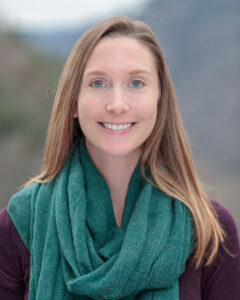
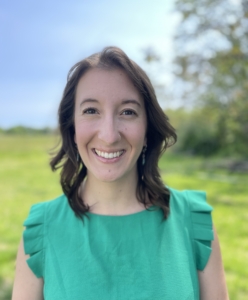
Wednesday, February 14, 2024
CLICK HERE FOR THE VIDEO RECORDING
CLICK HERE TO LEARN MORE WITH ADDITIONAL RESOURCES SHARED BY JENNA & MARIA
In recent years, sampling efforts have shown that West Virginia waters are contaminated with varying levels of per- and polyfluoroalkyl substances (PFAS). PFAS, also known as “forever chemicals,” do not break down in natural conditions and are toxic at very low levels, posing a serious risk to public and ecological health. Join Jenna Dodson and Maria Russo from West Virginia Rivers Coalition to hear about levels of PFAS contamination around the state, legislative solutions, and how you can get involved to protect the health of your community.
About the Presenters:
About Jenna: Jenna Dodson (she/her) is the staff scientist at West Virginia Rivers Coalition. She coordinates a variety of source water protection and policy programs, including the WV-VA Water Quality Monitoring Program. She is passionate about community engagement and science communication. After graduating from Virginia Commonwealth University with a B.S. and M.S. in Environmental Studies, she served as an agroforestry extension agent in Peace Corps Senegal. She has worked as a research assistant at Gothenburg University and West Virginia University, and previously coordinated the Georgia Adopt-A-Stream water quality monitoring program. Outside of work, she can usually be found by a river trail running, birding, biking, rock climbing or doing acroyoga.
About Maria: – Maria was raised on a small farm in Jefferson County, West Virginia, where she developed her passion for protecting the natural environment. After earning her degrees from Brown University in Public Policy and Latin American Studies, Maria worked on a variety of policy campaigns, ranging from criminal justice to environmental protection. Maria is committed to responsible policymaking and centering directly impacted people in decision-making processes, to ensure effective participation in building the future we want to see. In her downtime, you can find Maria walking barefoot, listening to live music, or floating down the river with friends.
Quantifying the threat posed by and developing sustainable solutions for invasive spotted lanternfly
 Wednesday, January 10, 2024
Wednesday, January 10, 2024
CLICK HERE FOR THE VIDEO RECORDING
Dr. Leskey will present the spotted lanternfly life history and invasion patterns, current research on the host plants that are at risk to injury (wine grapes) and those likely not to be impacted, how scientists monitor for their presence (traps and eDNA), and some sustainable solutions for their management (biological control, entomopathogenic fungi).
About the Presenter – Tracy Leskey holds a PhD in Entomology from the University of Massachusetts, a MS in Ecology from the Pennsylvania State University, and a BS from Wilson College. Dr. Leskey has been employed by the USDA-ARS, Appalachian Fruit Research Station in Kearneysville for over 20 years where she serves as Station Director and Research Entomologist. Her research has focused on development of behaviorally-based management tools for invasive and persistent native pests of fruit crops. She has published over 180 peer-reviewed journal articles and several patents. Dr. Leskey has been interviewed by the New York Times, Washington Post and NPR on numerous occasions and appeared live on Fox News and C-SPAN and have done several stories with National Geographic. She has served on the Governing Board of the Entomological Society of America and currently serves on the Board of Trustees at Wilson College.
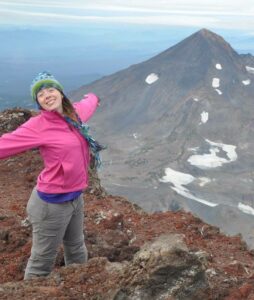 Volcanoes
Volcanoes
Wednesday, November 8, 2023
CLICK HERE FOR THE VIDEO RECORDING
For as long as humans have lived with volcanoes, humans have had deep, multifaceted connections to these landforms that have shaped their lives in so many ways. Volcanoes can be a source of harm for the hundreds of millions of people living on or near their slopes. Yet volcanoes are also a source of good. These majestic, beautiful landforms inspire. They create rich, diverse ecosystems, near and far. They are the source of many materials used by people since time immemorial to the present day.
Come and learn about some of the many ways to think about and appreciate these awe-inspiring forces of nature! Sonja will cover topics ranging from the science of volcanoes to human connections to volcanoes. She will bring some of her personal collection of volcano art, photos, and other doodads from her time at volcanoes.
About the Presenter – Sonja joined the PVAS team in Spring 2023. Sonja began her career in environmental education during her time as a camp counselor during summers in college in western Pennsylvania. In 2008, Sonja earned her B.S. in physics and geology from the University of Pittsburgh and her M.S. in geology from the State University of New York at Buffalo. Since then, Sonja has worked in informal education at Montserrat Volcano Observatory, Craters of the Moon National Monument and Preserve, and Mount St. Helens Institute. Sonja enjoys crafting (especially crocheting), reading/learning about new topics, and spending time with her dog Pepper and other loved ones.
 Unboxing the Conservation and Management of West Virginia’s Box Turtles
Unboxing the Conservation and Management of West Virginia’s Box Turtles
Wednesday, October 11, 2023
CLICK HERE FOR THE VIDEO RECORDING
Most folks have a fond memory of seeing a box turtle. Whether it’s witnessing a box turtle stroll through their backyard, or visiting their garden, or helping one that has accidentally made its way onto a road, people often have positive, caring interactions with box turtles, and for this reason, the species serves as a phenomenal ambassador for connecting people to nature. But box turtles are in trouble—a variety of threats, from habitat loss to illegal collection have resulted in declines of box turtles across the species range, prompting biologists to take action. In West Virginia, the WVDNR has been working diligently to enhance box turtle conservation and develop new and effective conservation strategies to keep the charismatic box turtle on the landscape and continuing to promote wild and wonderful West Virginia. Come learn about box turtles, how the WVDNR are working to protect West Virginia’s box turtles, and how you can take action to help protect them.
About the Presenter – Kevin Oxenrider is the Amphibian and Reptile Program Leader with the West Virginia Division of Natural Resources. Kevin oversees conservation, management, and research actions for West Virginia’s diverse amphibians and reptiles statewide, and represents West Virginia on regional, national, and international working groups and committees to collaborate on amphibian and reptile conservation. He serves as a leading partner on the Eastern Box Turtle Working Group and has been an integral part of developing range wide conservation actions for box turtles.
 Pioneering Women in Conservation History- Herstories of the Known and Unknown
Pioneering Women in Conservation History- Herstories of the Known and Unknown
Wednesday, September 13, 2023
CLICK HERE FOR THE VIDEO RECORDING
Let’s travel back in time to visit with women in conservation history—with naturalists, scientists, adventurers, and advocates. How did a couple of cousins hosting tea parties in Boston play a role in stopping the slaughter of birds for fashion? What did a New York socialite and suffragist-turned-
About the Presenter – Maria Parisi is a Potomac Valley Master Naturalist and Potomac Valley Audubon Society member who works for the U.S. Fish and Wildlife Service’s (Service) National Conservation Training Center (NCTC) in Shepherdstown, WV. As the Partnerships Team Lead, she co-manages the History, Library, and Partnerships Branch where she also edits the Service’s Conservation History journal. After working on a journal issue with a feature essay on the history of conservation in the United States, which told the story of a few white men we credit for legislation that informs conservation today, she turned to explore women in conservation history—in and beyond the Service. In her free time, Maria can often be found in her garden planting natives and improving habitat for wildlife.
Raptors in Flight
Wednesday, May 12, 2022
Matt Orsie will lead a fascinating discussion about the identification of hawks and eagles on the wing as well as information about the timing of migration. Click HERE for the video recording.
 Recycling Trends in Our Area
Recycling Trends in Our Area
Wednesday, March 9, 2022
Clint Hogbin talks about the trends in the Berkeley County recycling and litter control programs and discuss Entsorga; a mechanical and biological treatment plant located in Martinsburg, WV. Click HERE for the video recording.
 Coexisting with Beavers
Coexisting with Beavers
Wednesday, February 9, 2022
Presenter: Alison Zak, founder of the Human-Beaver Coexistence Fund (HBCF)
Alison Zak presents “Coexisting with Beavers: A Dam Worthy Challenge”. Everyone is welcome to join PVAS for our (Virtual) February Monthly Program where Alison Zak discusses a little beaver ecology and behavior, a lot about the benefits beavers provide for people/other species/the environment, and most applicably, how to coexist with beavers! Click HERE for the video recording.
2021 Programs
 Randy Robinson, USFWS, presents Bald Eagles of the Potomac Valley. Randy coordinates the NCTC Eaglecam project in partnership with the Outdoor Channel and the Friends of NCTC to support conservation education. During this presentation, he will give an in-depth look at the bald eagles of the Potomac Valley. Randy will use photos and video clips to discuss bald eagle behavior, biology, nest history and some of the technology needed to keep the eagle nest video streaming to our homes and school classrooms. Click HERE for the video recording.
Randy Robinson, USFWS, presents Bald Eagles of the Potomac Valley. Randy coordinates the NCTC Eaglecam project in partnership with the Outdoor Channel and the Friends of NCTC to support conservation education. During this presentation, he will give an in-depth look at the bald eagles of the Potomac Valley. Randy will use photos and video clips to discuss bald eagle behavior, biology, nest history and some of the technology needed to keep the eagle nest video streaming to our homes and school classrooms. Click HERE for the video recording.
 October 2021: “When Birds Collide” Feather Identification at the Smithsonian Institution
October 2021: “When Birds Collide” Feather Identification at the Smithsonian Institution
Watch Here https://youtu.be/Pk8k_jLLshQ
